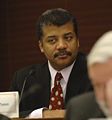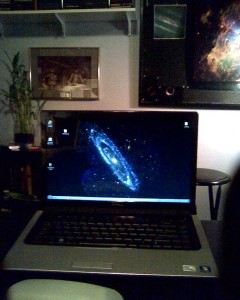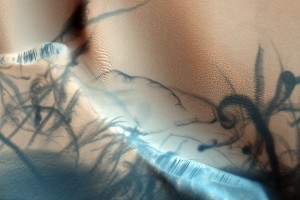Every now and then when channel surfing, I check what’s going on below channel 3 on my dish satellite listing — where the channel numbers suddenly crazily convert to 9000’s.   You’ll find some religious shows (ack!), women’s basketball (zzzz), and something called the Research Channel.
Yes, I’m a geek. And proud of it.
The presentations sometimes actually get so far down the bare bones as to consist of some guy (usually a guy, yes; although if primates are involved, it’ll be a woman) and a microphone and a whiteboard or chalkboard, or overhead projector.   And some cool corner of science.
This time, I saw the title “Urban Astrophysicist”.    Had to see it!  Clicked and:
Neil deGrasse Tyson!
Now, I love Neil deGrasse Tyson.  I’m always looking for good science communicators, and he’s been at the top of my list for quite a while — long before he became as well-known as he is today.  Long before his appearances on the Tonight Show, the Daily Show, Colbert Report, and hosting Nova Now, and all.

But here’s the interesting thing: true to the Research Channel, it was bare-bones.  Tyson, a room full of actual students of science, a very geeky interviewer, and the camera (which seemed also to be operated by some sort of student).
I found this fascinating, after seeing the slicker presentations of his recent career.  Just talking, answering questions.
Because, without all the bells and whistles and special effects, without the easy sound-bites, the thing that I love best about Tyson came forward and stood front-and-center.
It’s the same thing that I love about all the best science popularizers: they communicate not just the facts of science, but the passion of science.
Carl Sagan did that, too — and yeah, everybody’s measuring Tyson against Sagan. We loved Carl Sagan; we miss Carl Sagan. Everyone’s looking for the next Carl Sagan.
But here’s my opinion on the subject:
There is no next Carl Sagan — nor should there be.
I think that we get the science communicator appropriate to our time.  Sagan came out of the seventies and eighties, with his turtleneck and Beatles haircut. The way he presented science was almost spiritual, at a time when we were coming out of the strait-jacketed fifties, and thinking cosmically, expanding our consciousnesses.  And he was giving us something better than LSD, because it was real, accessible to all of us, all this glorious, true wonder, true beauty right there.
But now, who was before him?  I’m writing this off the top of my head, so I don’t want to stop and do research… but when I think of actual scientists, someone who might represent the face of science, so to speak, it’s Richard Feynman who comes to mind.  With, as well as the actual science, his wild parties, and his bongoes and all.
So… Sagan sort of hippie; Feynman a beatnik?  Am I talking out of my hat, or am I on to something here?
What about before that? The name I know best is Roy Chapman Andrews.
A Manly Man.  Articles for Argosy magazine.  Hunting the Blue Tiger in Thailand South China; organizing a caravan of scientists in those new-fangled automobiles, driving into the Gobi Desert, while having to contend with Chinese bandits.  An adventurer.
All of them communicated the love of science as well as the facts of science. But they each did it in very different ways.
The successful science communicator that we get in any era is someone who speaks the language we are ready to hear.  And that will be different for each era.
So, the question is: what’s next? And who?
Meanwhile, I found that entire interview with Tyson (1.5 hrs) on the Research Channel website.  If you don’t want to see the whole thing (and it’s worth it, believe me), there are excerpts on Tyson’s own site.
Okay, I’ve spent enough time geeking out about this… must go do something else.
(Hmm. Geek, geek… might that be the language of our time?….)



